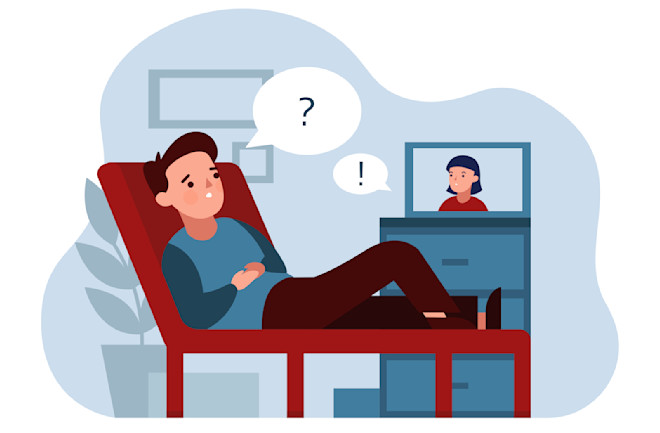Holistic Treatment: Find Therapy for Chronic Illness in Houston
Holistic Treatment: Find Therapy for Chronic Illness in Houston
Blog Article
Unboxing the Effectiveness of EMDR Treatment for Anxiousness Alleviation
As the occurrence of stress and anxiety problems remains to rise, discovering reliable therapeutic treatments is critical. Eye Movement Desensitization and Reprocessing (EMDR) therapy has gathered attention for its purported efficiency in alleviating stress and anxiety symptoms. Nevertheless, in the middle of the expanding rate of interest in EMDR, concerns persist about its true effectiveness and the systems whereby it runs. By analyzing the elaborate interaction between EMDR and anxiety relief, we may discover useful understandings right into the possibility of this therapeutic technique. Stay tuned as we dissect the nuances of EMDR treatment in the context of stress and anxiety monitoring, losing light on its promise and constraints.
Background of EMDR Therapy
Originally created in the late 1980s by psychologist Francine Shapiro, Eye Motion Desensitization and Reprocessing (EMDR) treatment has because gained acknowledgment as an efficient therapy for different psychological health and wellness conditions. Shapiro's exploration of EMDR was serendipitous, as she observed that certain eye activities appeared to lower the intensity of adverse thoughts and feelings. This monitoring resulted in the organized advancement of EMDR as a structured therapy technique.
EMDR is established on the concept that distressing memories are inadequately processed and saved in the brain, leading to the advancement of emotional issues. The treatment intends to assist in the reprocessing of these memories, making them less disturbing and helping people to integrate them a lot more adaptively. With a series of standardized methods, consisting of bilateral excitement such as eye motions or faucets, EMDR overviews patients with the handling of traumatic experiences.
Over the years, EMDR has developed from its preliminary focus on dealing with trauma (PTSD) to resolving a large range of psychological health conditions, consisting of anxiousness, clinical depression, fears, and more. Its effectiveness and efficiency have made it a beneficial tool in the healing landscape.
Understanding Stress And Anxiety and EMDR
Shapiro's groundbreaking advancement of Eye Movement Desensitization and Reprocessing (EMDR) therapy not just changed the treatment of trauma but likewise led the way for a much deeper understanding of just how EMDR can effectively alleviate anxiety symptoms in individuals. Anxiousness disorders incorporate a variety of conditions defined by too much worry, worry, and uneasiness, typically bring about significant distress and impairment in day-to-day performance. EMDR treatment targets upsetting memories and unfavorable beliefs that add to stress and anxiety, making use of reciprocal excitement to help with the processing of these experiences. By engaging the brain's natural recovery devices through led eye motions or various other types of bilateral stimulation, EMDR aids people reprocess distressing memories, decrease emotional reactivity, and establish flexible coping devices. Research studies have actually revealed appealing outcomes in utilizing EMDR for numerous stress and anxiety problems, such as generalised anxiousness condition, social anxiety condition, and panic problem, highlighting its efficiency in relieving stress and anxiety signs and symptoms and enhancing general wellness.
Effectiveness of EMDR for Anxiousness
Study searchings for have actually continually shown the efficiency of Eye Movement Desensitization look at here now and Reprocessing (EMDR) treatment in lowering anxiousness signs and symptoms throughout numerous stress and anxiety disorders. Research studies have shown that EMDR is particularly useful for people with trauma (PTSD), generalized stress and anxiety problem (GAD), phobias, panic attack, and social stress and anxiety condition. EMDR's efficiency in treating stress and anxiety is associated to its one-of-a-kind technique of targeting upsetting memories or experiences that contribute to the advancement and maintenance of stress and anxiety symptoms.
A meta-analysis released in the Journal of Stress And Anxiety, Tension & Coping discovered that EMDR considerably minimized anxiety signs compared to manage conditions, with the effects lasting in time. EMDR has been shown to be as reliable as cognitive-behavioral therapy (CBT) in reducing stress and anxiety signs and symptoms, with some researches suggesting that EMDR might lead to faster enhancements for certain people.
Neurobiological Devices of EMDR
The effectiveness of Eye Activity Desensitization and Reprocessing (EMDR) for anxiety alleviation has actually led scientists to explore the neurobiological devices underlying its therapeutic results. Throughout EMDR treatment, the bilateral stimulation, such as eye motions or faucets, may activate the mind's information processing devices, leading to the reconsolidation of stressful memories.
Additionally, research studies making use of neuroimaging methods have actually shown that EMDR therapy can lead to adjustments in brain task, especially in areas associated with emotional handling and memory, such as the amygdala and hippocampus. virtual therapist houston. These neurobiological adjustments may add to the observed decreases in anxiousness symptoms complying with EMDR treatment. More research study is needed to totally elucidate the exact neurobiological devices through which EMDR exerts its restorative impacts on anxiousness
Applying EMDR Strategies

Therapists tailor the EMDR strategy to fit specific demands, thinking about factors like the nature of the anxiousness, personal history, and client choices. The reciprocal excitement made use of in EMDR is thought to involve working memory, cultivating flexible processing of upsetting memories and promoting emotional guideline. Through duplicated sets of bilateral stimulation, people usually report a decrease in the emotional strength connected with anxiety-provoking memories. By skillfully applying EMDR strategies, therapists can aid clients in relieving stress and anxiety signs and promoting mental well-being.
Verdict

Report this page